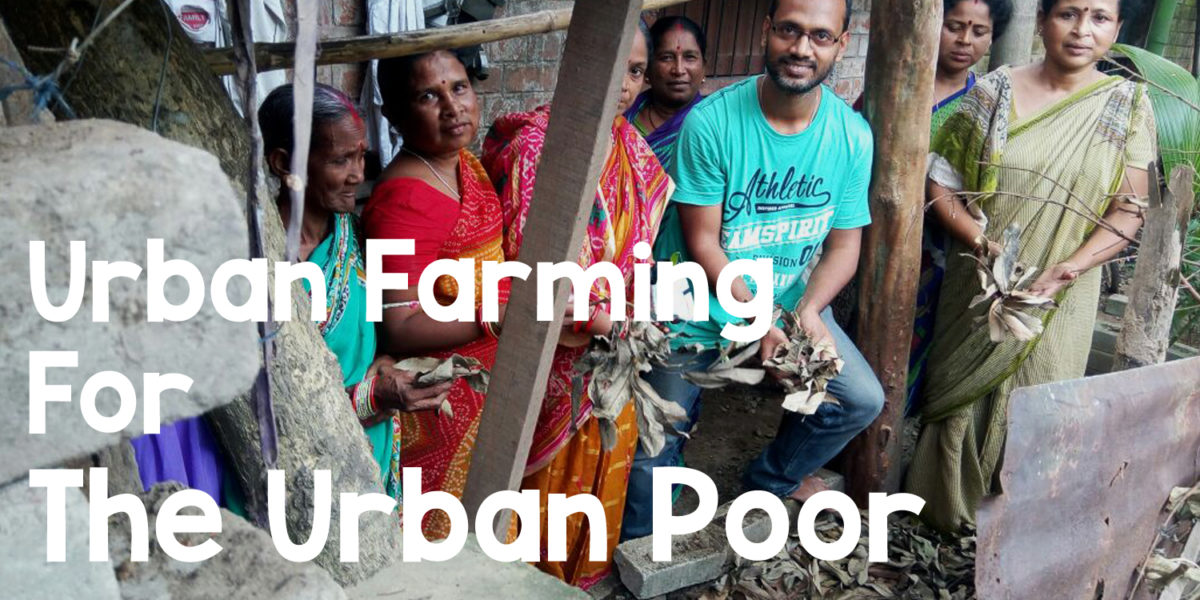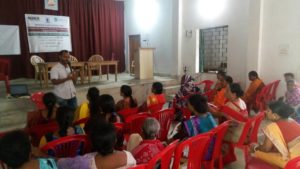
For those of us living in cities we enjoy service of a lot of people in our everyday lives. The services range from newspaper delivery, cleaning services to home maintenance and home cooking. And these people who make our lives easier don’t lead a easy life themselves. They live in the same cities as us where the cost of living is substantially higher than the countryside and their meager income does not help their cause. As a result their access to fresh and nutritious food is quite limited. Urban farming can be one of the solutions to this problem. To assess whether the urban poor can grow a part of their own food, I visited a slum in Tulasipur, Cuttack back in June and carried out an awareness campaign on Urban farming. The entire program was carried out by an NGO called IIEC which works in the area of inclusive development of the underprivileged.
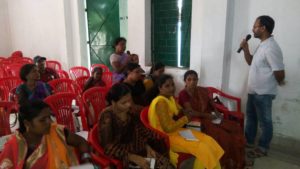
What I realized during the awareness campaign is that, though people live in cramped spaces, they do not live vertically. In other words they do not stay in apartments. Everyone stays in an individual house with limited space. But almost everyone has access to some space where they can grow a few vegetables. Some of them even have a concrete roof which is unused. On the bright side, I was very happy to see some of the residents already growing a few vegetables and green leafs.
After the awareness campaign was over a lot of the residents came forward and showed interest in learning techniques of organic urban farming . Their only caveat was that the input cost of this activity has to be near zero. I promised them to be back soon and share my experience with them.
Organic Urban Farming Training – Day 1
07 Sept 2017
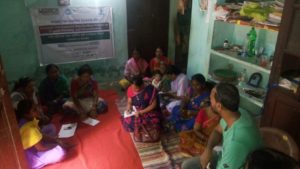
I had only 2 days for the training. So for day 1 I focused on hands on training that would get everyone going. For day 2 of training which was supposed to be held with at least 2 weeks gap, I decided to focus on class room training and discussions. Day 2 of the training was also for doing a review of what people would have done till then.
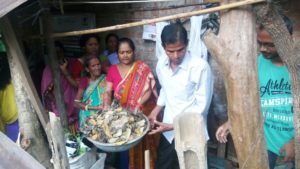
Training was arranged at the home of one of the participants. In the pre -lunch session I talked about garden bed preparation, potting mix features and preparation. The participants were very happy to learn how they can use organic waste like dry leaves, grass clippings and egg shell etc to build their garden soil. As I talked about using very cheap inputs like cow dung manure, compost, coco peat and oil seed cakes to prepare potting soil, it became clear to them that with very little input cost they can easily grow a few vegetables for their own consumption. I also stressed on mulching and its usefulness. The participants were really surprised to hear the benefits and importance of the same.
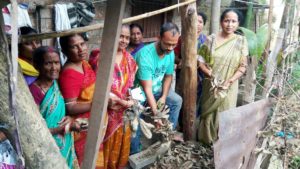
After a couple of hours of class room session we moved outside and I showed a demo of how to prepare a garden bed for growing vegetables. I got everyone to get their hands dirty and participate in making the bed. The layering of organic material, manure and soil was a lot of fun and everyone enjoyed making the lasagna garden bed and also coined a new term for it. They called it Biriyani bed. As biriyani is also a dish that is made by layering rice and meat alternatively I couldn’t have agreed more with the new name given to layered garden bed.
In the post lunch session we mixed potting soil and planted few seeds in a couple of pots. I also taught them how to prepare an organic fertilizer called Amrut jal using cow dung, cow urine, jaggery and water. And again the participants were pleasantly surprised to learn that they can easily make an excellent organic soil conditioner and fertilizer using animal waste which is easily available to them.
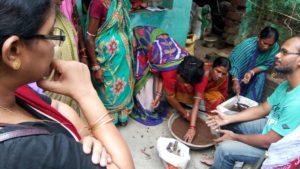
Day One of the training program ended with a question answer round. I was being bombarded with questions and had to really keep pace with them and answer each of them. I was very happy to see the usually shy people open up and get their questions answered. We came back after distributing a few tomato, beans, eggplant and bitter gourd seeds. The next training session was planned to be held after a couple of weeks, so that everyone can start on growing a few plants in the mean time. I really could not wait to come back and see the progress.
Organic Urban Farming Training – Day 2
24 Sept 2017
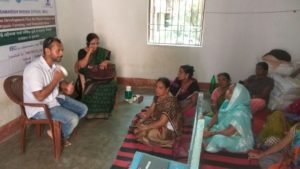
Couple of weeks and a few days later we were back in Tulsipur for the second and concluding part of organic urban farming training. This time the training was going to be mostly indoors and hence was held in the community hall of the locality. As a start we did a review of experience of the participants who had planted a few seeds in their backyards and containers. Most of them had positive news and were very happy to see success in germination and growth of the plants. Some people also had faced a few issues which we discussed and I suggested a few solutions. The next part of the training was pest management using organic methods. This is the session in which the participants had a lot of questions. I tried to answer as many as possible and suggested a few home made organic pesticides like neem spray, giger garlic spray and chilli spray as solution.
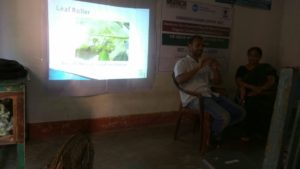
Post lunch I talked about composting kitchen waste and showed the participants how to do it in the correct way. Waste disposal in cities, especially in the slum area is a huge issue. Organic waste dumped near their locality creates a lot of problems for the residents. As they learnt how to compost kitchen waste it became clear to them that not only they can reduce the garbage problem, they get good quality compost for their plants by composting their organic waste.
In the end after the final question answer session the participants looked a little concerned. As the training program had ended they were not sure whether they could get solutions to their gardening problems in future. I promised the participants to support them further on their farming journey through phone and bid farewell.
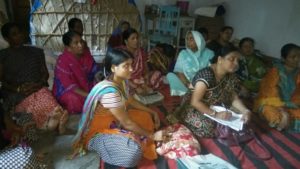
I believe that to be able to grow a few fruits and vegetables is a basic life skill everyone must possess. Organic gardening not only helps to get fresh and nutritious vegetables in our diets, it also helps people to grow as human beings by working with nature. About six months earlier I had taken a proposal of organic urban farming training for the urban poor to IIEC. And this day I feel very happy and content to have been able to impart some of my experience to them.


